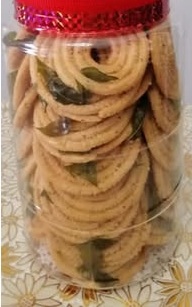
Image used as illustration courtesy of Muruku Homemade FB
BATU PAHAT, Oct 19: Every Deepavali, the aroma of spices and ghee begins to fill the homes of the Indian community across the country.
For 60-year-old S Artiletchumy, the Festival of Lights is incomplete without two essential family traditions: muruku and omapodi (Indian snacks made mainly from rice flour and spices), prepared using recipes passed down through three generations.
She sees making these two traditional delicacies as a symbol of family love and carefully preserved heritage.
“I learned this recipe from my mother when I was a teenager, and she learned it from my grandmother. The spirit of Deepavali truly arrives whenever our family gathers to make muruku and omapodi.
“It’s not just about cooking; it’s about bringing the family together,” she told Bernama at her home on Jalan Jeragan in Batu Pahat recently.
Artiletchumy said that although many now opt to buy ready-made festive treats, her family remains committed to making their own, as the fruits of one’s own labour bring an incomparable sense of satisfaction.
This spirit has now been passed to the younger generation in her family, as she shares the heirloom recipes with her 27-year-old daughter-in-law, R Devayanni, and her 26-year-old nephew, M Devesh, who is a chef.
“I want them to continue this tradition. When I am no longer here, let them be the ones to carry it on,” she said.
In the lead-up to each Deepavali, Artiletchumy’s home transforms into a vibrant ‘mini factory’ as she receives orders for more than 50 containers of muruku and omapodi. She is assisted by her sister-in-law, N Bimala, 60, and several other family members.
Her customers include not only members of the Indian community but also regular Chinese and Malay patrons.
“Many wait for this all year. I can barely keep up with the demand, but it brings me joy. This is my way of celebrating the spirit of Deepavali, by sharing our blessings and happiness with everyone, across all races,” she explained.
She emphasised that the process of making muruku requires patience, as the dough, made from muruku flour, rice flour, chickpea flour, white dal, ajwain seeds, sesame, and water, must be kneaded to the perfect consistency before being fried in hot oil.
Besides muruku and omapodi, other traditional treats that are a must in her home include achu muruku, known as kuih ros in the Malay community, and the popular sweet, laddu. Both are also made from scratch using old recipes handed down from her mother.
“Deepavali isn’t just about the lights; it’s about love, unity, and the memories we make with family. The true meaning of the festival comes alive when we gather, laughing and kneading dough and frying muruku together,” she said.
— BERNAMA